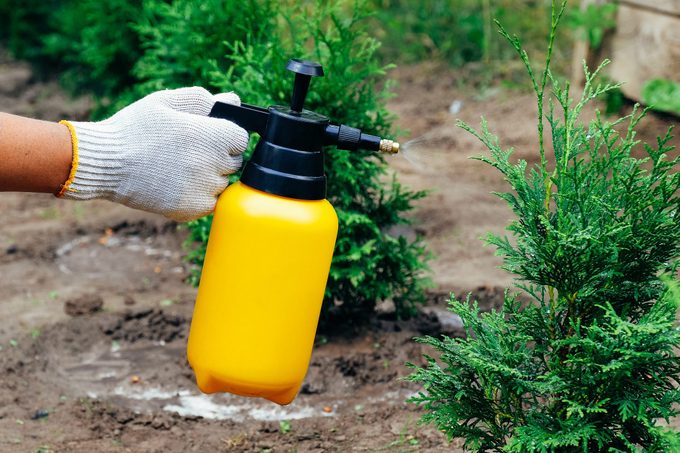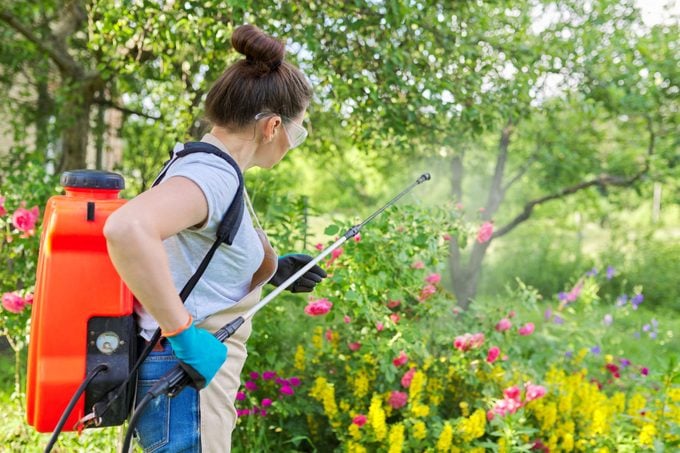Lawn Sprayers: What To Know Before You Buy
Ever wondered how lawn care professionals apply large quantities of liquid lawn care products so quickly? Their secret can make you faster at these jobs, too.
Besides experience and practice, lawn care pros are efficient mainly because of lawn sprayers. Learn more about what lawn sprayers do and the types of lawn sprayers available for you to consider.
What Is a Lawn Sprayer?
A lawn sprayer (AKA a garden sprayer) is a tool that allows you to easily apply lawn care products such as fertilizer, herbicide, fungicide or insecticide, while minimizing contact with these products. You can control the amount and concentration of the product on all four types of lawn sprayers.
Lawn sprayers work for other liquids, too. I’ve used my lawn sprayer to apply mold stain eraser and various non-film-forming wood finishes to patios and decks with great success.

Types of Lawn Sprayers
There are four types of lawn sprayers:
- Hose-end lawn sprayer: This type attaches to the end of a garden hose. A reservoir below the attachment and nozzle holds the product you want to spray. Once you attach the garden hose, you can adjust the amount of product mixed in with the water. A hose-end lawn sprayer is a good choice when spraying medium-sized areas provided you have a long enough hose.
- Handheld tank lawn sprayer: This is better for smaller areas. Whenever I use one, whether it’s a manual pump model or motorized, I mix the liquid in a plastic bucket ensure the correct ratio, then carefully pour the mixture into the sprayer tank.
- Backpack tank lawn sprayer: As the name suggests, you wear this type of lawn sprayer on your back. It’s easy to carry and great for larger areas.
- Wheeled tank lawn sprayer: A wheeled lawn sprayer comes as a tank set on a wheeled frame, making it easy to move around your yard. This type is good for extra-large areas.
How Does a Lawn Sprayer Work?
Basically, you pour liquid lawn care products in a basin, tank or pump, then spray. There are some operational differences. Hose-end sprayers mix the product and water together as the water goes through the nozzle. For tank lawn sprayers, you mix the concentrated product with water in the proper ratio. That mixture goes into the tank and is dispensed from there.
Lawn Sprayer Features
In determining which lawn sprayer is right for you, consider the following:
- Size of tank: These can vary from one gallon to 10 gallons or more.
- Weight and ease of transport: Regardless of the sprayer style and size, it’s important to consider how long you’ll be content to lug it around when it’s full of liquid. Backpack sprayers make this easier, but can be a pain to get on and off. Smaller handheld tank sprayers aren’t as heavy but require more frequent refills.
- Application rate adjustability: This feature allows you to select how much lawn care product to add to the water, often in teaspoons or tablespoons of product per gallon of water.
- Anti-clog filter: This helps keep the flow of the spray consistent, even if there’s debris in the sprayer.
How To Choose the Right Lawn Sprayer for the Job
Think about the size of the area you’re going to spray:
- For flowers, weeds or any small area: If you only have small patches of vegetation to spray, you might not even need an actual lawn sprayer. A hand-held, chemical-resistant spray bottle might be enough. If not, a tank lawn sprayer will provide enough space to hold the fertilizer mixture needed for smaller jobs.
- For a yard or larger lawn area: A wheeled or backpack lawn sprayer is easy to take with you around the area you want to cover.
Additional factors to keep in mind when choosing the right lawn sprayer include:
- Frequency of application: If you’re going to be applying products regularly, a lawn sprayer with a larger capacity might be better. Add more product whenever needed, mixing it with water according to manufacturer’s instructions. Be sure to leave your sprayer empty and properly rinsed between jobs.
- Battery-operated or manual pump action: A battery-operated sprayer powers the pump that keeps the necessary pressure in the tank to drive the mixture through the spray nozzle. With a manual pump, you need to pump the sprayer every so often to create pressure in the tank.
Lawn Sprayer Safety and Maintenance
Here are some things to keep in mind when using a lawn sprayer:
- Make sure your lawn sprayer isn’t leaking.
- Wear gloves to keep lawn care products off your skin.
- Keep the equipment used for mixing lawn care products separate from the equipment for other household uses.
- Carefully read the requirements for each product. Is it a concentrate that needs to be mixed with water, or is it premixed and ready to apply?
- Some products require people and pets stay off the area for a certain period of time. Stick to that timeline.

No comments